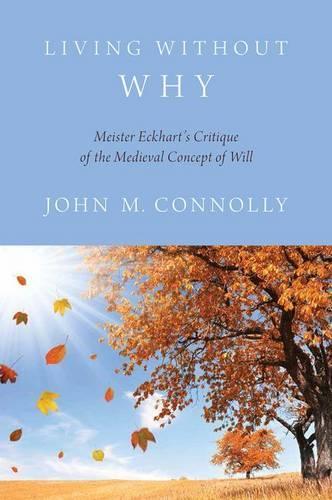Full Product Details
Author: John M. Connolly (Sophia Smith Professor of Philosophy, Sophia Smith Professor of Philosophy, Smith College, USA)
Publisher: Oxford University Press Inc
Imprint: Oxford University Press Inc
Dimensions:
Width: 15.70cm
, Height: 2.50cm
, Length: 23.60cm
Weight: 0.476kg
ISBN: 9780199359783
ISBN 10: 0199359784
Pages: 256
Publication Date: 21 August 2014
Audience:
College/higher education
,
Postgraduate, Research & Scholarly
Format: Hardback
Publisher's Status: Active
Availability: To order

Stock availability from the supplier is unknown. We will order it for you and ship this item to you once it is received by us.
Reviews
This book is a signal contribution to ancient and medieval philosophy. By putting Eckhart into conversation with his predecessors (i.e., Aristotle, Augustine, and Aquinas), Connolly does a fine job in identifying where Eckhart makes an original-and still viable-contribution to moral thought in general. This is a remarkable work, the product of long and careful thought, as well as being clearly presented. --Bernard McGinn, Naomi Shenstone Donnelley Professor Emeritus of Historical Theology and of the History of Christianity in the Divinity School and the Committees on Medieval Studies and on General Studies, University of Chicago It would appear that Connolly has written the right book at the right moment. Through his work, the English-speaking world can become finally acquainted with the academic discussion of the last decades concerning Eckhart and can furthermore have an original and text grounded interpretation of a relevant section of his philosophical thought. --Loris Sturlese, Professor of Medieval Philosophy, Universita del Salento
"""This book is a signal contribution to ancient and medieval philosophy. By putting Eckhart into conversation with his predecessors (i.e., Aristotle, Augustine, and Aquinas), Connolly does a fine job in identifying where Eckhart makes an original-and still viable-contribution to moral thought in general. This is a remarkable work, the product of long and careful thought, as well as being clearly presented."" --Bernard McGinn, Naomi Shenstone Donnelley Professor Emeritus of Historical Theology and of the History of Christianity in the Divinity School and the Committees on Medieval Studies and on General Studies, University of Chicago ""It would appear that Connolly has written the right book at the right moment. Through his work, the English-speaking world can become finally acquainted with the academic discussion of the last decades concerning Eckhart and can furthermore have an original and text grounded interpretation of a relevant section of his philosophical thought.""--Loris Sturlese, Professor of Medieval Philosophy, Università del Salento ""As John Connolly states in the preface to this book, he is 'fascinated' by Meister Eckhart's advice to 'live without why (or will)'. And it is this palpable fascination pulsing off the book's pages that at once helps to illuminate the philosophical underpinnings of the Eckhartian concept, as it infectiously draws the reader deeper into the riches of this text. As a scholar of Christian spirituality, and someone also smitten by the Meister's treatment of sunder warumbe, but not a trained philosopher, I find this book to be nothing short of a boon."" -- Medieval Mystical Theology ""All in all, this is a very welcome and careful study. It will shed much light on a neglected person and a neglected topic."" -- Journal of the History of Philosophy ""Connolly's book, by highlighting the importance of the end of man in Eckhart's thought and by putting it in its philosophical and theological context, is always illuminating in its treatment of the great mystic."" -- The Review of Metaphysics ""Connolly offers a fair and scholarly treatment of one of medieval Europe's most controversial philosophers, who challenged the very authority of the Catholic Church. This work is well written, if synoptic at times, and leads the reader through a rich historical, theological and philosophical journey through the medieval conception of the will as it developed from Aristotle and the classical Greek philosophers, all the way to Meister Eckhart and beyond. Moreover, it generally does a good job of analyzing the almost indiscernible and more obvious variations amongst the philosophies being addressed. Connolly's specialty in Eckhartian studies is apparent through his scholarly treatment of a plethora of medieval thinkers, and his mastery over the primary sources in their original medieval High German."" -- British Journal for the History of Philosophy"
This book is a signal contribution to ancient and medieval philosophy. By putting Eckhart into conversation with his predecessors (i.e., Aristotle, Augustine, and Aquinas), Connolly does a fine job in identifying where Eckhart makes an original-and still viable-contribution to moral thought in general. This is a remarkable work, the product of long and careful thought, as well as being clearly presented. Bernard McGinn, Naomi Shenstone Donnelley Professor Emeritus of Historical Theology and of the History of Christianity in the Divinity School and the Committees on Medieval Studies and on General Studies, University of Chicago It would appear that Connolly has written the right book at the right moment. Through his work, the English-speaking world can become finally acquainted with the academic discussion of the last decades concerning Eckhart and can furthermore have an original and text grounded interpretation of a relevant section of his philosophical thought. Loris Sturlese, Professor of Medieval Philosophy, Universita del Salento
Author Information
John M. Connolly is Sophia Smith Professor of Philosophy at Smith College. His research is currently focused on medieval philosophy, especially Meister Eckhart. He has also worked in philosophy of mind, Wittgenstein, contemporary German philosophy, philosophical hermeneutics, and issues of academic freedom and tolerance. Connolly has taught courses in all of these areas and also in the history of philosophy. In addition he spent ten years in college administration as dean, provost, and acting president of Smith College.




